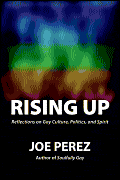 Rising Up:
Rising Up:
Reflections on Gay Culture, Politics, and Spirit
By Joe Perez
Lulu Publication, pb, 248 pp, $15.75
Also available from Lulu.com as an e-book for $6.25.
Reviewed by Toby Johnson
Joe Perez moderates the Gay Spirituality and Culture blog on the Internet. With blogging having become a major force in American media and politics, Perez’s blog constitutes a major gay presence in the new electronic/virtual media world. The blog hosts columns by a variety of writers (occasionally including this reviewer) as well as linking to Perez’s own extensive writing at joe-perez.com.
Perez’s book, Rising Up, demonstrates another facet of his creativity within this virtual world. For the book is a hybrid of traditional writing/publishing and the new Internet-inspired style of blogging. It is a compilation of columns and postings Perez has written for the blogosphere, and then edited and rearranged for book publication. This is a new kind of writing and a new phenomenon in the book world.
There are several levels, therefore, at which to review this book: first, simply the phenomenon of a blog-based book, second, the “personalistic” style of writing occasioned by blogging, and third, the content.
The first level is easy: this is probably the wave of the future. The nature of posting on the Internet is that it’s fleeting and ephemeral. Electronic media demonstrates one of those Buddhist insights into existence: everything is transitory, existing like a bubble or a dream. Brilliant writers post brilliant, incisive commentaries on the web. But these exist only as electronic signals flashing round the world at light speed and getting lost in the torrent of such signals, then disappearing into the past. It’s a natural impulse of serious writers, thinkers, and commentators to want to preserve their best writing and to organize their insights to make them more accessible. And it’s an appropriate writer’s discipline to edit and rewrite one’s material. So the blog turned literature is a logical outgrowth of this computer phenomenon. Joe Perez really is riding the crest of the wave.
The second level of critique is much more complex. Blogging is almost necessarily reactive and interlinked. Blogging is a kind diary-keeping, without the confidentiality. Bloggers write in response to other blogs and postings on the web. In the electronic blog, the hyperlink is easy to create and easy for the reader to follow. In print, it doesn’t work that way. So, for instance, where traditional academic text would have a footnote, Perez’s blog text has a bracketed reference to a URL like [http://www.washingtonpost.com/wp-dyn/content/article/2005/05/16/AR200505-1601232]. Of course, that’s actually very easy to follow on the computer—easier than to a footnoted book you’d have to got to a library to find — but it is awfully inelegant in print. What’s more, the reactive style means the reader is only hearing one side of a debate. To Perez’s credit, he generally introduces and explains the text he is commenting on. This, indeed, is what a reader would expect from a serious and academically trained writer. Joe Perez is a Harvard graduate and done masters level work at the University of Chicago.
Blogging also tends to be sequential and timely. News comes out in bits and pieces and commentators are always dealing with it in the fleeting present. Thus their commentaries can lack perspective. Again to Perez’s credit, he has organized the book by themes and not by dates. His insights then come across as thoughtful and logically interconnected, not just reactive. But this is the major problem with this style of writing. Above I referred to this as personalistic. By that I mean that the reactive quality of blogging results in lots of first person pronouns and consequent subjectivity. Joe’s personality is very present.
The third level of critique is of content. Rising Up covers a lot of territory; as the subtitle indicates, the book is about culture, politics, and spirit, ranging from “Responding to religious traditionalists,” “Fighting HIV/AIDS,” “Looking at popular culture,” to “Elevating business and society,” “Connecting sex and soul,” and “Exploring spiritual alternatives.” (These are six exemplary chapter titles out of twelve.)
Joe Perez is a student of modern psycho-spirit culture theoretician Ken Wilbur. Wilbur’s ideas and models of experience and spiritual growth pervade Perez’s writing. Wilbur uses a lot of acronyms for his wide-ranging concepts (AQAL, for instance, for “All Quadrants, All Levels” meaning “comprehensive” and “flexible.”) Perez follows suit and uses the acronym STEAM for the processes of psychological and spiritual growth. Students of Wilbur’s will find Perez’s discussions very appropriate application to gay consciousness; non-Wilbur fans may find them confusing. The concept of “rising up” through the stages of personal growth unites all the various discussions including the nature of gay consciousness itself.
The book, like Internet surfing, doesn’t have to read from front to back. It’s filled with interesting and provocative comments, most of which stand alone. I thought the section on HIV/AIDS perhaps the most heartfelt. Joe Perez deserves to be read.
This is just an excerpt from this issue of White Crane. We are a reader-supported journal and need you to subscribe to keep this conversation going. So to read more from this wonderful issue SUBSCRIBE to White Crane. Thanks!